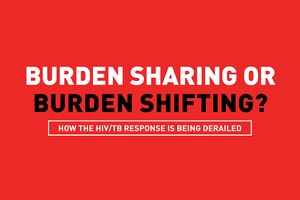Urgent funding boost and "reality check" needed to sustain HIV and TB progress
In advance of Global Fund replenishment conference, MSF releases report showing that many countries are not financially ready to cover HIV/TB response alone as global funding and political interest wanes.
NEW YORK/GENEVA/BRUSSELS, OCTOBER 7, 2019 — A decline in
international funding could reverse lifesaving gains and cause
an “epidemic rebound” of HIV and tuberculosis (TB)
in some countries, said Doctors Without Borders/Médecins
Sans Frontières (MSF) Monday in a report released ahead
of The Global Fund to Fight AIDS, Tuberculosis, and
Malaria’s replenishment conference. The international
medical humanitarian organization warned donors that neglecting
the program now and shifting financial burden to affected
countries after a decade of strong commitments to fight these
diseases would hurt people all over the world.
“Some of the countries reviewed in this report—such
as the Democratic Republic of Congo, Guinea, and
Mozambique—are struggling with conflict or political and
economic problems,” said Dr. Mit Philips, MSF’s
health policy and advocacy advisor and one of the contributing
authors of the report. “Yet, they are under pressure
to swiftly mobilize additional resources for HIV and TB within
restricted budgets and with insufficient donor funding. This
needs a serious reality check.”
Despite the fact that TB and HIV kill approximately two million
people each year, donor and domestic funding for HIV programs
declined in 2018 for the first time in more than a decade
(falling by $1 billion in low- and middle-income countries) and
the funding gap for TB programs widened further (reaching $3.5 billion), according to United Nations figures. The United States is
the Global Fund’s largest donor.
Based on studies in nine countries where MSF runs HIV and TB
programs—Central African Republic, Democratic Republic of
Congo, Eswatini, Guinea, Kenya, Malawi, Mozambique, Myanmar, and
Zimbabwe—the report,
Burden sharing or burden shifting?, documents how international funding shortfalls and insufficient
domestic resources available are already causing wide-ranging
gaps in HIV and TB diagnosis, prevention, and care.
“Every day, MSF teams in these countries witness how
patients are suffering and dying from these treatable
diseases,” said Dr. Maria Guevara, MSF’s senior
operational positioning and advocacy advisor and another of the
report’s contributing authors. “The number of people
on lifetime HIV treatment keeps on expanding, but the money
available to support them keeps on shrinking. With not enough
drugs or support services available, many people are not
starting treatment on time or are forced to abandon treatment
altogether. Others must dig deep into their pockets to pay for
drugs so as not to interrupt their treatment. All of this
contributes to increased transmission, higher mortality,
increased treatment failures, and an even higher prevalence of
drug resistance—further increasing the cost of care for
HIV and TB.”
According to MSF’s report, the impact of current HIV and
TB funding gaps are underestimated and likely to increase as
vulnerable countries struggle to compensate for the decline in
external financial support. Even where the political will exists
to contribute more, many countries are not ready to take on this
responsibility in the short term.
Considering the existing economic and fiscal challenges,
the authors of the report call for a comprehensive assessment of
countries’ real ability to increase domestic health
resources in the short term, given the impact of funding
cuts on the lives of people living with HIV and TB and the
ability of health workers to care for them.
Source:
Médecins Sans Frontières


